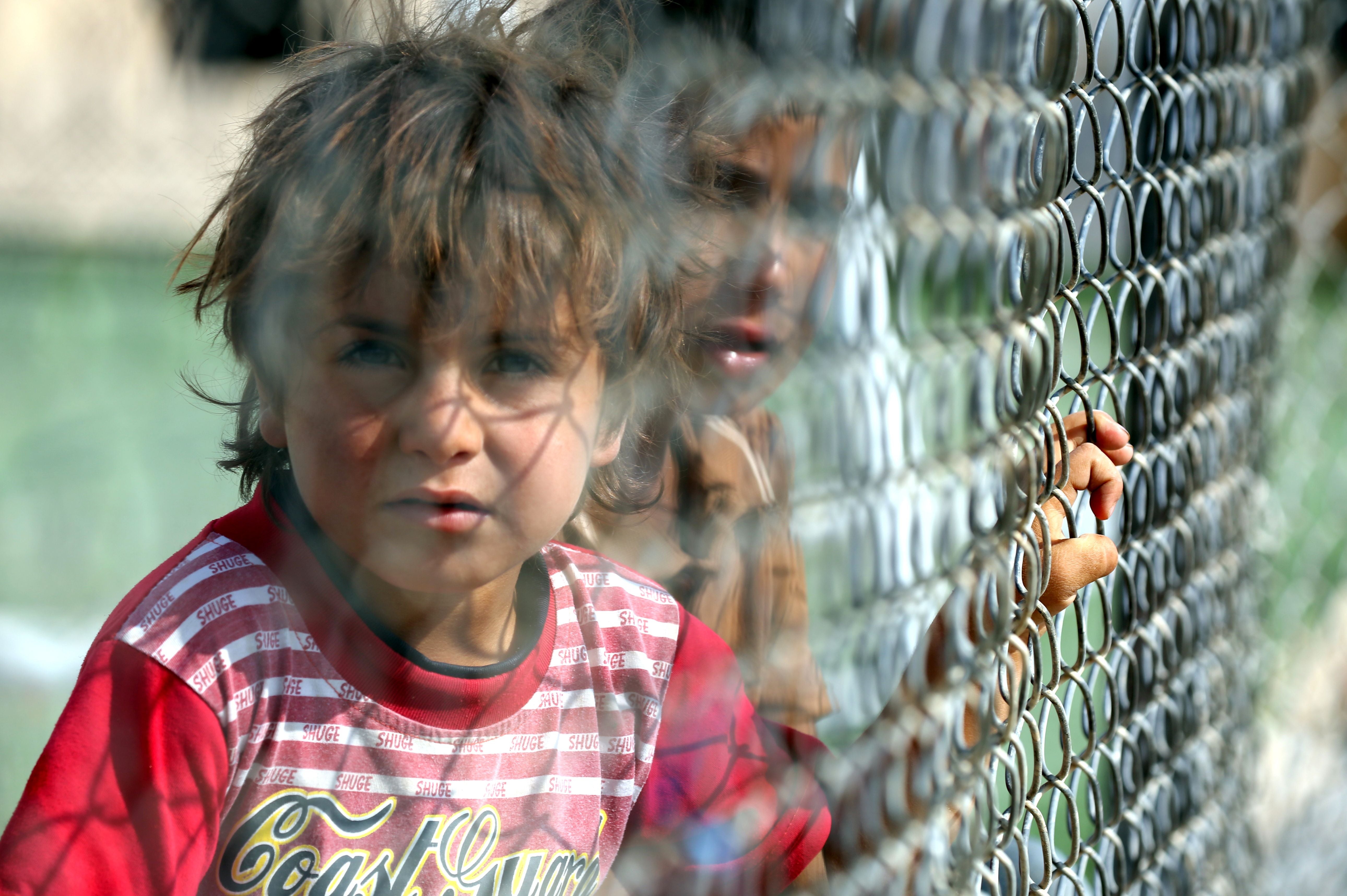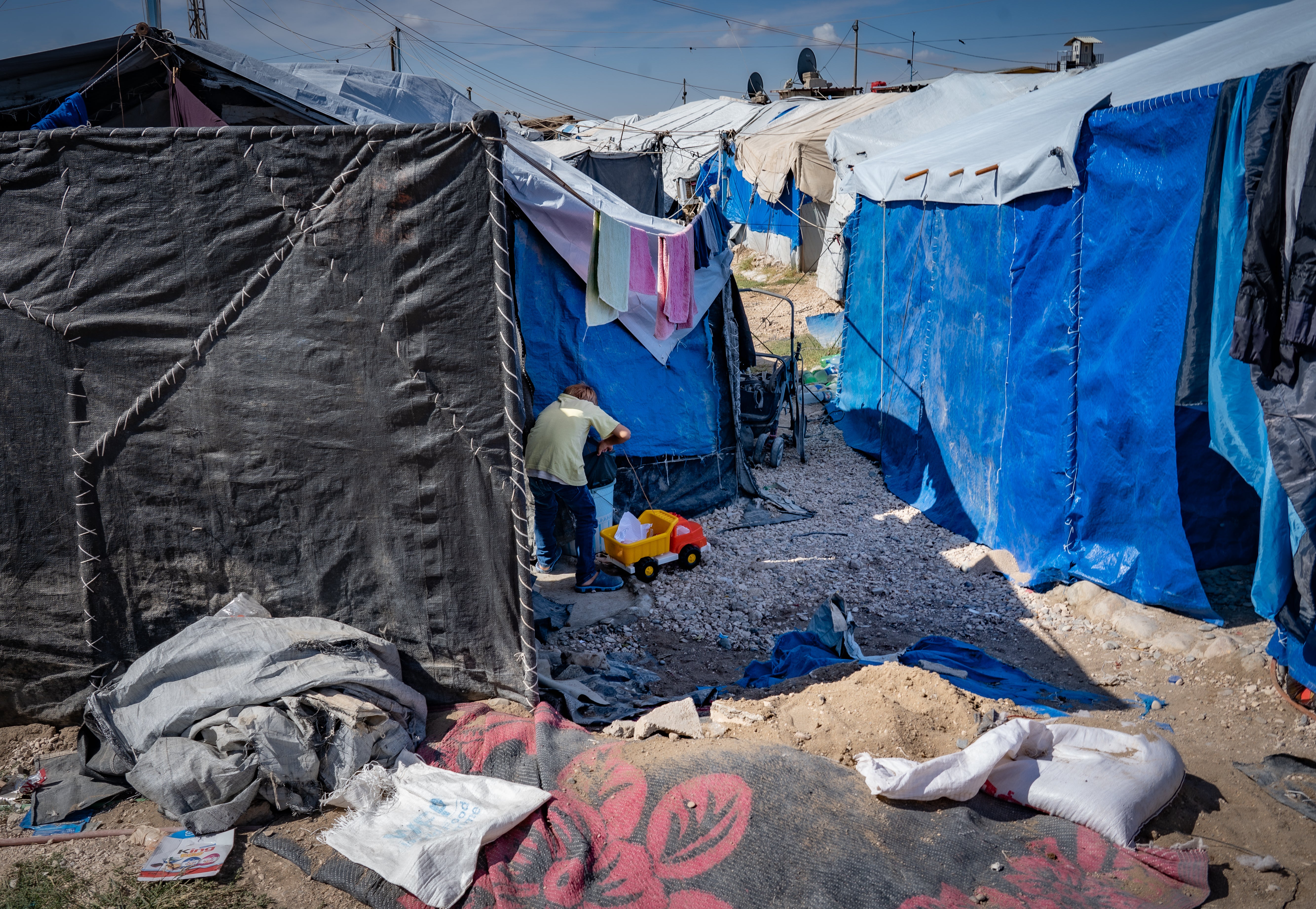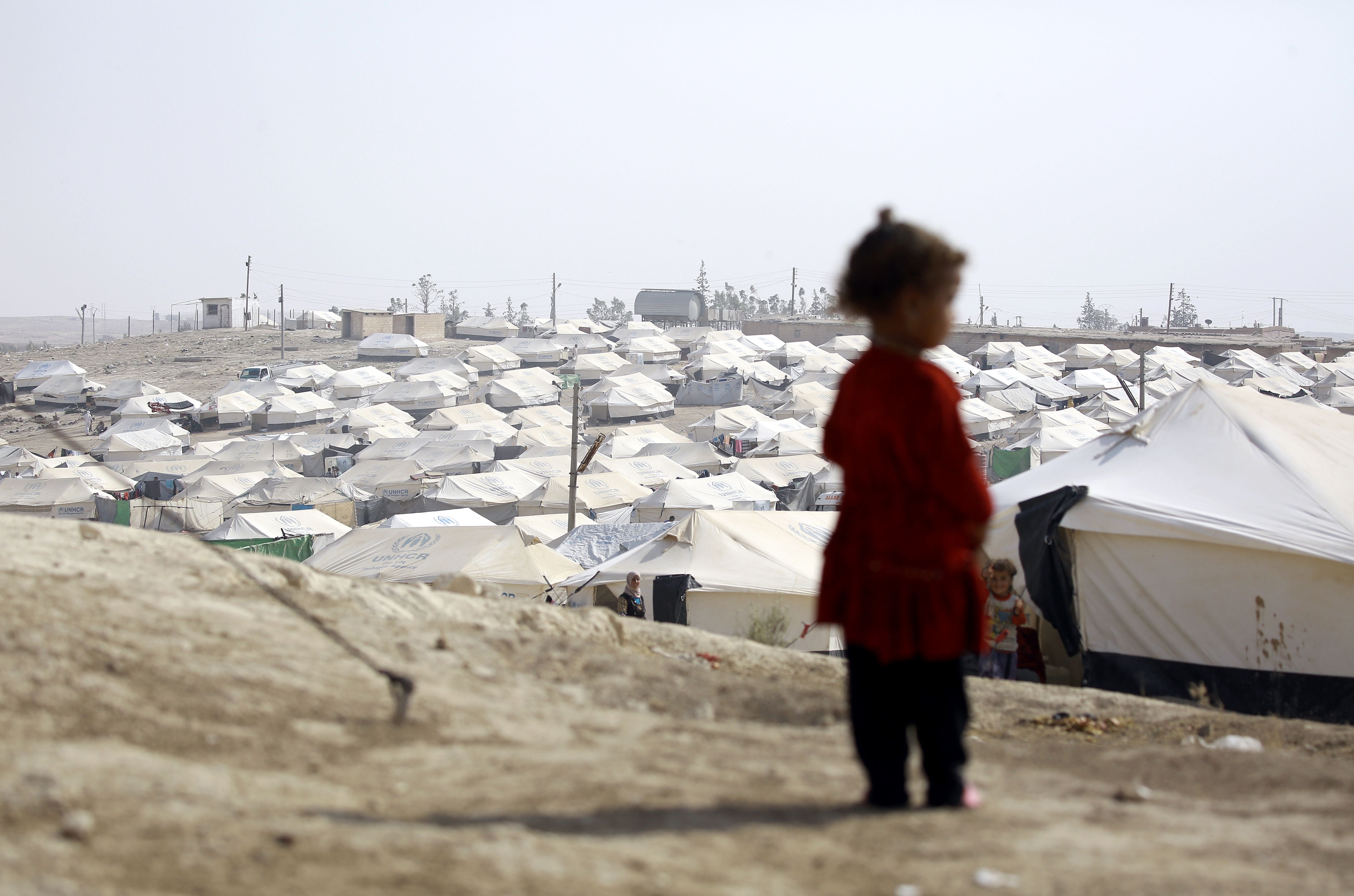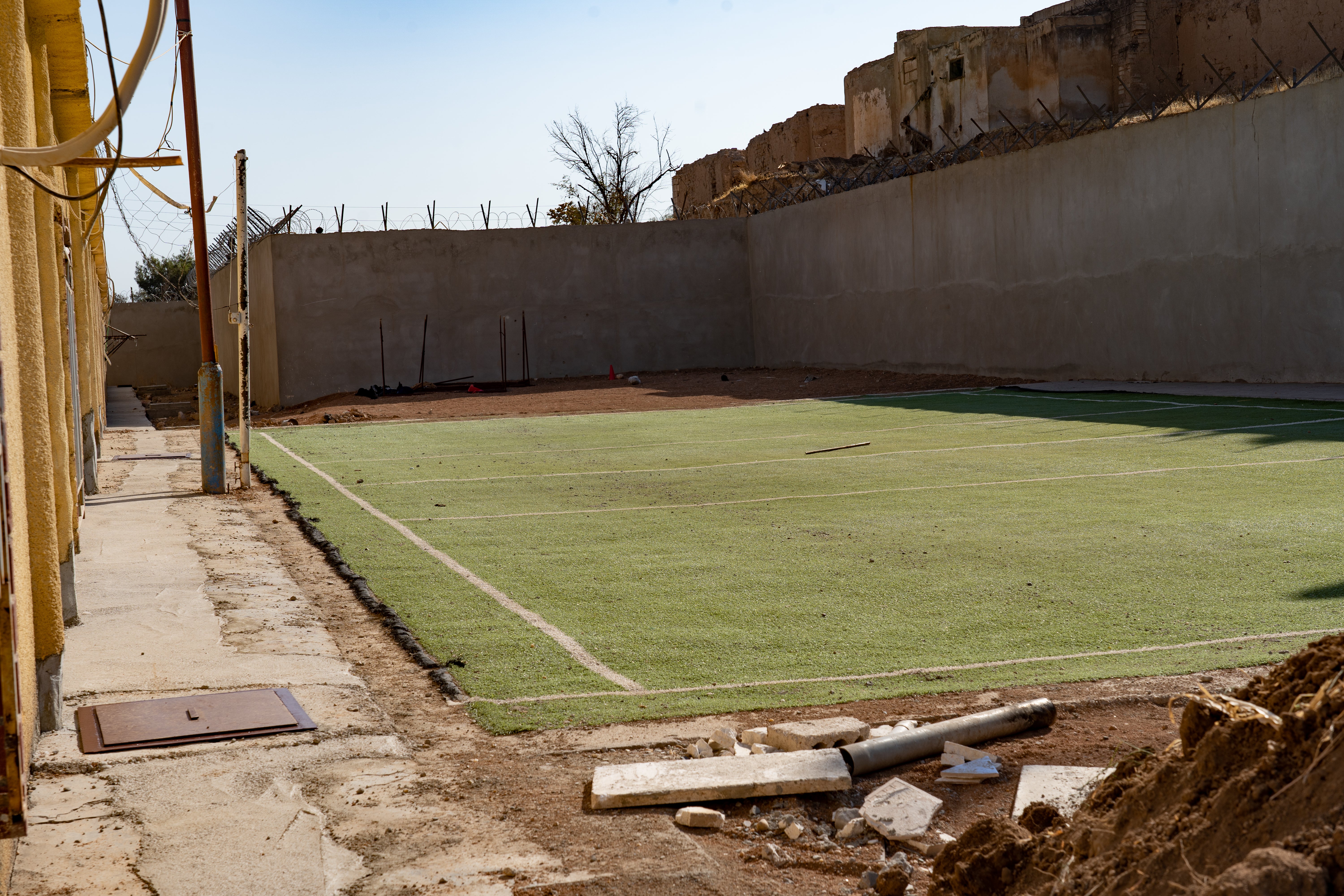Trapped and traumatised: Thousands of foreign children languish in Syrian camps with no hope of going home
Having endured the horrors of Islamic State, the future for children held in detention across northeast Syria is bleak, as many have been abandoned by their governments, Bel Trew reports from Tal Marouf


The sun rises and the boys at the al-Houri deradicalisation centre and orphanage in northeast Syria move listlessly through yet another day of chores, in what is effectively a prison.
The 120 children, from more than 25 different countries, huddle on the benches in the small courtyard of the Kurdish-run facility. A medley of languages drifts through the winter mist: one of the only things that unites these boys is that they grew up for years under the Islamic State’s caliphate and now find themselves a long way from their families and homelands.
There are tens of thousands of such children across the region held in grim conditions the UN says might be akin to torture. Many of them have foreign citizenship yet have little hope of going home because they are stigmatised due to an association with Isis and have been abandoned by governments – including the UK – who refuse to repatriate them.
One of them is Ahmed, a 13-year-old orphan originally from Pakistan who, unprompted, is frighteningly frank about watching every member of his immediate family die in US-led coalition airstrikes.
“I don’t remember much other than that I saw many people be killed,” he tells The Independent.
Ahmed loves drawing and English football, after spending several years in London, the only other place on earth he really knows. He says he was living in the UK when, in 2015, his mother made the fateful decision to move to Raqqa, dragging her children along with her.
“After everyone in my family was killed I was living in a tent with my mum’s friend but she escaped to Turkey and so I am now in this orphanage,” he adds quietly.
“Here we just sit with our friends doing nothing all day. We watch TV movies and do some basic lessons. Even (the) playground is not finished.”
The mandate of the centre, like other similar ones in north-east Syria, is confusing. Many of the boys are orphans after their families were killed in the US-led coalition war to crush Isis.
Some were forced by Isis to train as would-be fighters as part of the “cubs of the caliphate”.
Others have parents who joined Isis and are still alive but inmates of nearby detention camps such as al-Hol and Roj. All of them have a bleak future. There is no end in sight of their incarceration. There are no solutions.
It’s simple, countries need to take their children home
Sitting in the same courtyard as Ahmed, 15-year-old Mohammed, who claims to have US nationality, also recalls with startling calmness the horrific violence he has endured, including watching children burn to death in tents after air raids.
Traumatised and alone, he says he also spends his days doing nothing.
“I have to learn something for my future. I can’t just sit here and watch my future burn,” he adds with desperation in his voice. “It was not my choice to come here. My mother brought me. I feel like I’m being punished for my mum’s decisions.”
The two boys are among more than 40,000 children from Syria, Iraq and dozens of foreign countries being held in similar prison-like centres and sprawling camps in north-east Syria since the caliphate was dismantled. As many as 35 of them are thought to be British.
According to a count by The Independent, the UK has only repatriated seven unaccompanied minors and has not yet brought home any British children who live with their parents.
United Nations Special Rapporteur Fionnuala Ní Aoláin has raised the alarm about the facilities holding these children, saying the conditions are so bad that, in some circumstances, it might amount to torture as there is inadequate shelter, overcrowding and malnourishment.
In a May 2021 report, she specifically raised the issue of the deradicalisation centres such as al-Houri, pointing out that there was no adequate legal basis to justify the detention of children who have no chance of leaving unless their country of citizenship repatriates them.

The Kurdish authorities running the centres and camps say they are completely overwhelmed and lack the resources to look after so many people.
“This is a heavy load on our shoulders, taking care of nearly 30 nationalities,” says the head of al-Houri, who declined to be named for security reasons.
“It’s simple, countries need to take their children home.”
In February 2021, Unicef estimated there were more than 22,000 foreign children of at least 60 nationalities languishing in camps and prisons in the northeast, in addition to many thousands of Syrian children.
Al-Houri is actually one of the better and safer facilities where children are being held. Save The Children reports that in al-Hol detention camp – a sprawling tent city – 62 children died from different causes in the first nine months of last year. Two of them were murdered.
At al-Hol and Roj, children from dozens of countries play shoeless in the dust and dirt. According to their parents, they suffer from malnutrition and several diseases because of a lack of available medication. There is no proper schooling.
In interviews with The Independent, several mothers, who come from countries including the UK, Tunisia and Russia, say their children are often afraid to leave their tents as violence has soared.
I am innocent, this is my father’s fault
Rights groups are trying to plug the gaps.
“Aid agencies are doing the best they can but we simply cannot meet any kind of international standards,” explains Save The Children’s Sonia Kush, after a recent visit to al-Houri centre, Roj and al-Hol camps, where the charity runs education centres.
“Allowing these children to grow up in desolate camps in north-east Syria with a sense of abandonment, isolation and a lack of belonging anywhere – this will make them very vulnerable in the future to exploitation and abuse. Whether by one of the many armed groups in Syria or by criminal elements.”
Among the inmates of the camps are those British children who have not been repatriated.
The Home Office told The Independent they were willing to bring back orphans or unaccompanied British children “where feasible and there is no risk to UK national security”.
But they made it clear the British government is not willing to take children with their parents, some of whom have had their citizenship stripped.
The UK has been criticised by campaigners and lawmakers in recent months for a contentious bill that would, in various circumstances, allow someone’s citizenship to be revoked without any warning. This would essentially leave people in dangerous limbo abroad and effectively cut off the chance of appeal, legal experts say.

Furthermore, rights groups said that instead of focusing on bringing British children home, the UK is actually providing millions of pounds worth of funding to a Syrian prison that is currently holding hundreds of children of Islamic State members.
A Home Office spokesperson defended the funding, saying that as part of the Global Coalition Against Daesh, the UK had provided technical advice and money for the refurbishment and expansion of a detention facility for Isis fighters and their affiliates to “enhance conditions for those detained and help meet international standards”.
“Our priority is to ensure the safety and security of the UK. Those who remain in the conflict zone include some of the most dangerous, choosing to stay to fight or otherwise support Daesh,” the spokesperson added. “Judgements should not be made about the national security risk someone poses based on their gender or age.”
But activists argue this is inhumane and not at all helpful for national security in the UK.
“The government should not be spending taxpayer money on building cages for kids,” says Maya Foa, director of Reprieve, which is representing several citizens who are stuck in Syria.
“The UK government should be directing its funding to bringing the small number of British families home, where the kids can receive the rehabilitation support they need, and adults can be prosecuted where appropriate.”
Back at the al-Houri centre, the administration is building a small football pitch to boost the morale of boys who are processing years worth of trauma, from abuse, neglect and war.

In the courtyard, a teenager called Azer from Chechnya explains how his father forced him to join the “cubs of the caliphate” aged just nine.
“I’ve been here for so long, why don’t they take me home,” he says. “I am innocent, this is my father’s fault.”
Hassan, a 15-year-old from Trinidad and Tobago, describes how his little brother killed himself after their father coerced them into joining him in the move to Raqqa in 2015 on the promise that they would be moving to an exciting new home with a swimming pool.
Most of his family were killed in Isis’s last holdout at Baghouz. His elder brother survived but Hassan thinks he is in a jail for Isis fighters. The teenager says he is so depressed he finds it hard to sleep.
“We go to school but it’s not a good school, we get an hour of class per day,” he adds listlessly.
“Every day is the same day. I have nothing to do. I sit in my room. I just want to go home. It has been years. Please let us go home.”
All names have been changed






Join our commenting forum
Join thought-provoking conversations, follow other Independent readers and see their replies
Comments